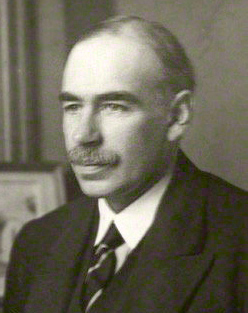Original: «We are being afflicted with a new disease of which some readers may not yet have heard the name, but of which they will hear a great deal in the years to come – namely "technological unemployment". This means unemployment due to our discovery of means of economizing the use of labor outrunning the pace at which we can find new uses for labor».
Fuente: The General Theory of Unemployment, Interest and Money, 1931.
Frases célebres de John Maynard Keynes
Fuente: Ensayos de persuasión.
Fuente: El fin del laisez-faire.
“Los especuladores son una consecuencia y no una causa de los precios altos.”
La especulación financiera
Fuente: Ensayos de persuasión.
Frases sobre la riqueza de John Maynard Keynes
Fuente: Teoría general del empleo, interés y la moneda.
John Maynard Keynes Frases y Citas
La especulación financiera
Fuente: Lords of Finance: 1929, The Great Depression, and the Bankers who Broke the World.
Fuente: Teoría general del empleo, interés y la moneda.
Fuente: Ensayos de persuasión.
Fuente: Teoría general del empleo, del interés y la moneda.
Fuente: Ensayos de persuasión.
La especulación financiera
Fuente: Teoría general del empleo, del interés y la moneda, 1936.
La especulación financiera
Fuente: Teoría general del empleo, del interés y la moneda, 1936.
La especulación financiera
Fuente: Las consecuencias económicas de la paz.
Respuesta a la pregunta: "¿Por qué no me afilio al Partido Laborista?"
Fuente: De su conferencia ¿Soy un liberal?, recogida en Ensayos en persuasión, 1925.
John Maynard Keynes: Frases en inglés
Fuente: The Economic Consequences of the Peace (1919), Chapter IV, p. 56
Fuente: The Economic Consequences of the Peace (1919), Chapter II, Section III, p. 20
Attributed by [Hal R., Varian, http://www.ischool.berkeley.edu/~hal/people/hal/NYTimes/2003-06-04.html, Dealing with Deflation, The New York Times, June 5, 2003, 2007-01-11]
Attributed
Essays in Persuasion (1931), The Economic Consequences of Mr. Churchill (1925)
Essays in Persuasion (1931), The Economic Consequences of Mr. Churchill (1925)
On David Lloyd George and Woodrow Wilson, in Chapter III, p. 41
The Economic Consequences of the Peace (1919)
Fuente: The Economic Consequences of the Peace (1919), Chapter II, Section I, p. 15
Attributed by [Will, Hutton, http://www.guardian.co.uk/commentisfree/2008/nov/02/economics-economy-john-keynes, Will the real Keynes stand up, not this sad caricature?, Guardian, November 2, 2008, 2009-02-05]
Actual quote: "the Stock Exchange revalues many investments every day and the revaluations give a frequent opportunity to the individual (though not to the community as a whole) to revise his commitments. It is as though a farmer, having tapped his barometer after breakfast, could decide to remove his capital from the farming business between 10 and 11 in the morning and reconsider whether he should return to it later in the week."
The General Theory of Employment, Interest and Money (1935), Ch. 12 http://www.marxists.org/reference/subject/economics/keynes/general-theory/ch12.htm
Attributed
“But the dreams of designing diplomats do not always prosper, and we must trust the future.”
Fuente: The Economic Consequences of the Peace (1919), Chapter IV, Section III, p. 105
Essays in Persuasion (1931), The End of Gold Standard (1931)
Fuente: How to Pay for the War (1940), Ch. 8 : Rationing Price Control and Wage Control
Essays in Persuasion (1931), Economic Possibilities for our Grandchildren (1930)
“Economics is a very dangerous science.”
Fuente: Essays In Biography (1933), Robert Malthus: The First of the Cambridge Economists, p. 128
“Perhaps it is historically true that no order of society ever perishes save by its own hand.”
Fuente: The Economic Consequences of the Peace (1919), Chapter VI, p. 238
“Most men love money and security more, and creation and construction less, as they get older.”
Essays in Persuasion (1931), Clissold (1927)
Fuente: Essays in Persuasion (1931), The End of Laissez-faire (1926), Ch. 5
Fuente: The Economic Consequences of the Peace (1919), Chapter II, Section I, pp. 14-15
A Tract on Monetary Reform (1923), Ch. 2 : Public Finance and Changes in the Value of Money
Fuente: Essays In Biography (1933), Alfred Marshall, p. 170; as cited in: Donald Moggridge (2002), Maynard Keynes: An Economist's Biography, p. 424
“The next move is with the head, and fists must wait.”
Fuente: Essays In Biography (1933), Trotsky On England, p. 91
“There is no harm in being sometimes wrong — especially if one is promptly found out.”
Fuente: Essays In Biography (1933), Alfred Marshall, p. 175
“The forces of the nineteenth century have run their course and are exhausted.”
Fuente: The Economic Consequences of the Peace (1919), Chapter VII, p. 254
Essays in Persuasion (1931), The Economic Consequences of Mr. Churchill (1925)
Essays in Persuasion (1931), Social Consequences of Changes in The Value of Money (1923)
“Stalin-Wells Talk: The Verbatim Report and A Discussion”, G.B. Shaw, J.M. Keynes et al., London, The New Statesman and Nation, (1934) p. 35
“Stalin-Wells Talk: The Verbatim Report and A Discussion”, G.B. Shaw, J.M. Keynes et al., London, The New Statesman and Nation, (1934) p. 34
“My only regret is that I have not drunk more champagne in my life.”
At a King's College college feast, as quoted in 1949, John Maynard Keynes, 1883-1946, Fellow and Bursar, (A memoir prepared by direction of the Council of King’s College, Cambridge University, England), Cambridge University Press, 1949, page 37. This in turn quoted in Quote Investigator, " My Only Regret Is That I Have Not Drunk More Champagne In My Life https://quoteinvestigator.com/2013/07/11/more-champagne/", 2013-07-11
Attributed
Letter to Kingsley Martin on the Spanish Civil War (9 August 1937), quoted in Kingsley Martin, Editor: A Second Volume of Autobiography, 1931–45 (1968), p. 257
1930s
Fuente: Laissez-faire and Communism (1926), pp. 99
